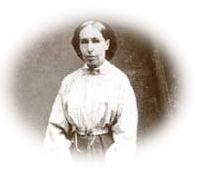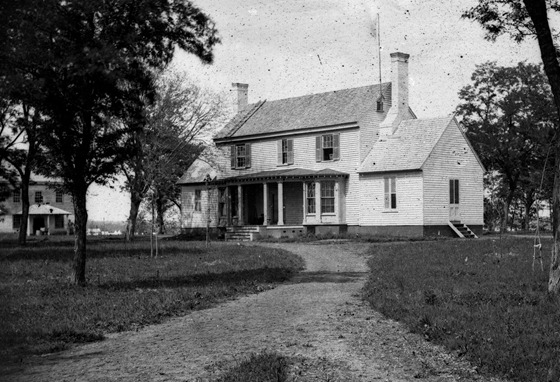May 17th.
One of these days, when peace is restored and we are quietly settled in our allotted corners of this wide world without any particularly exciting event to alarm us; and with the knowledge of what is now the future, and will then be the dead past; seeing that all has been for the best for us in the end; that all has come right in spite of us, we will wonder how we could ever have been foolish enough to await each hour in such breathless anxiety. We will ask ourselves if it was really true that nightly, as we lay down to sleep, we did not dare plan for the morning, feeling that we might be homeless and beggars before the dawn. How unreal it will then seem! We will say it was our wild imagination, perhaps. But how bitterly, horribly true it is now!
Four days ago the Yankees left us, to attack Vicksburg, leaving their flag flying in the Garrison without a man to guard it, and with the understanding that the town would be held responsible for it. It was intended for a trap; and it succeeded. For night before last, it was pulled down and torn to pieces.
Now, unless Will will have the kindness to sink a dozen of their ships up there, — I hear he has command of the lower batteries, — they will be back in a few days, and will execute their threat of shelling the town. If they do, what will become of us? All we expect in the way of earthly property is as yet mere paper, which will be so much trash if the South is ruined, as it consists of debts due father by many planters for professional services rendered, who, of course, will be ruined, too, so all money is gone. That is nothing, we will not be ashamed to earn our bread, so let it go.
But this house is at least a shelter from the weather, all sentiment apart. And our servants, too; how could they manage without us? The Yankees, on the river, and a band of guerrillas in the woods, are equally anxious to precipitate a fight. Between the two fires, what chance for us? It would take only a little while to burn the city over our heads. They say the women and children must be removed, these guerrillas. Where, please? Charlie says we must go to Greenwell. And have this house pillaged? For Butler has decreed that no unoccupied house shall be respected. If we stay through the battle, if the Federals are victorious, we will suffer. For the officers here were reported to have said, “If the people here did not treat them decently, they would know what it was when Billy Wilson’s crew arrived. They would give them a lesson!” That select crowd is now in New Orleans. Heaven help us when they reach here! It is in these small cities that the greatest outrages are perpetrated. What are we to do?
A new proclamation from Butler has just come. It seems that the ladies have an ugly way of gathering their skirts when the Federals pass, to avoid any possible contact. Some even turn up their noses. Unladylike, to say the least. But it is, maybe, owing to the odor they have, which is said to be unbearable even at this early season of the year. Butler says, whereas the so-called ladies of New Orleans insult his men and officers, he gives one and all permission to insult any or all who so treat them, then and there, with the assurance that the women will not receive the slightest protection from the Government, and that the men will all be justified. I did not have time to read it, but repeat it as it was told to me by mother, who is in utter despair at the brutality of the thing. These men our brothers? Not mine! Let us hope for the honor of their nation that Butler is not counted among the gentlemen of the land. And so, if any man should fancy he cared to kiss me, he could do so under the pretext that I had pulled my dress from under his feet! That will justify them! And if we decline their visits, they can insult us under the plea of a prior affront. Oh! Gibbes! George! Jimmy! never did we need your protection as sorely as now. And not to know even whether you are alive! When Charlie joins the army, we will be defenseless, indeed. Come to my bosom, O my discarded carving-knife, laid aside under the impression that these men were gentlemen. We will be close friends once more. And if you must have a sheath, perhaps I may find one for you in the heart of the first man who attempts to Butlerize me. I never dreamed of kissing any man save my father and brothers. And why any one should care to kiss any one else, I fail to understand. And I do not propose to learn to make exceptions.
Still no word from the boys. We hear that Norfolk has been evacuated; but no details. George was there. Gibbes is wherever Johnston is, presumably on the Rappahannock; but it is more than six weeks since we have heard from either of them, and all communication is cut off.







 17th.—But little worthy of note to-day, except the increasing impatience of the army. They begin to complain of the Commander in Chief, and, I fear, with some ground of justice. This morning the whole plain of 80,000 men, with its five hundred wagons, ambulances and carts, its five thousand horses, and all the paraphenalia of the army, was ordered to be ready to move at 12 M., precisely. At 11 we ate our dinners; then came the details of men for loading the heavy boxes and chests, striking, rolling and loading tents, which, by hard work, was accomplished by the hour fixed, and noon found us all in column; the word “march” was given, and off we started; moved about fifteen rods, wheeled (teams and all) out of the road into a beautiful field of wheat; wheeled again, and in a few minutes found ourselves right where we started from, with orders to unload and pitch tents. A few regimental groans went up as complimentary of the movement, and in two hours we were again settled. The object of this movement is now known to me, and so small and contemptible was it, so mixed up with the gratification of a petty vindictiveness, that, for the honor of the army, and some of its sub-commanders, I leave it unrecorded, hoping to forget it.
17th.—But little worthy of note to-day, except the increasing impatience of the army. They begin to complain of the Commander in Chief, and, I fear, with some ground of justice. This morning the whole plain of 80,000 men, with its five hundred wagons, ambulances and carts, its five thousand horses, and all the paraphenalia of the army, was ordered to be ready to move at 12 M., precisely. At 11 we ate our dinners; then came the details of men for loading the heavy boxes and chests, striking, rolling and loading tents, which, by hard work, was accomplished by the hour fixed, and noon found us all in column; the word “march” was given, and off we started; moved about fifteen rods, wheeled (teams and all) out of the road into a beautiful field of wheat; wheeled again, and in a few minutes found ourselves right where we started from, with orders to unload and pitch tents. A few regimental groans went up as complimentary of the movement, and in two hours we were again settled. The object of this movement is now known to me, and so small and contemptible was it, so mixed up with the gratification of a petty vindictiveness, that, for the honor of the army, and some of its sub-commanders, I leave it unrecorded, hoping to forget it.


